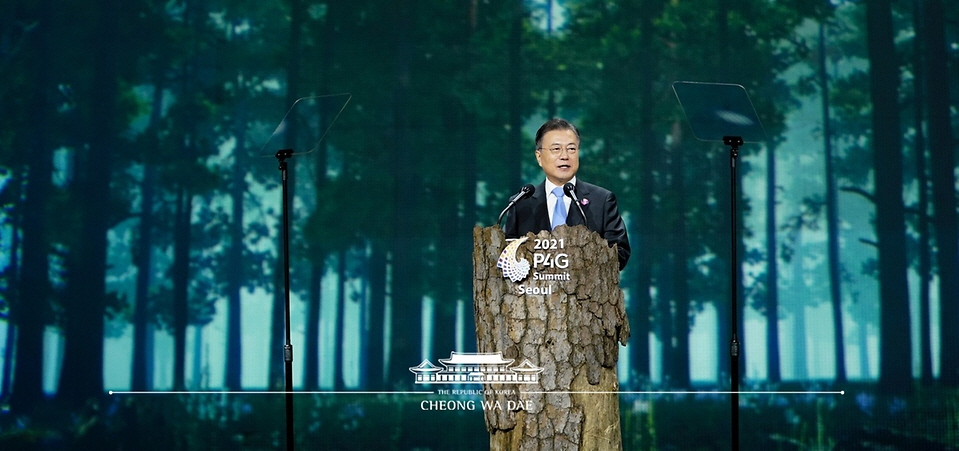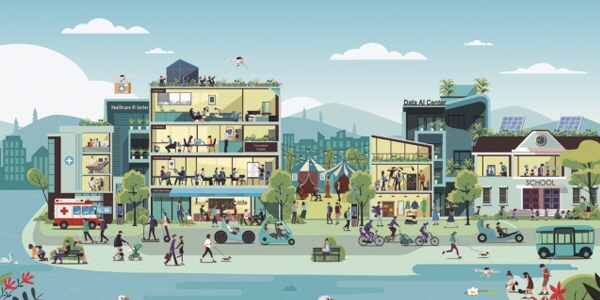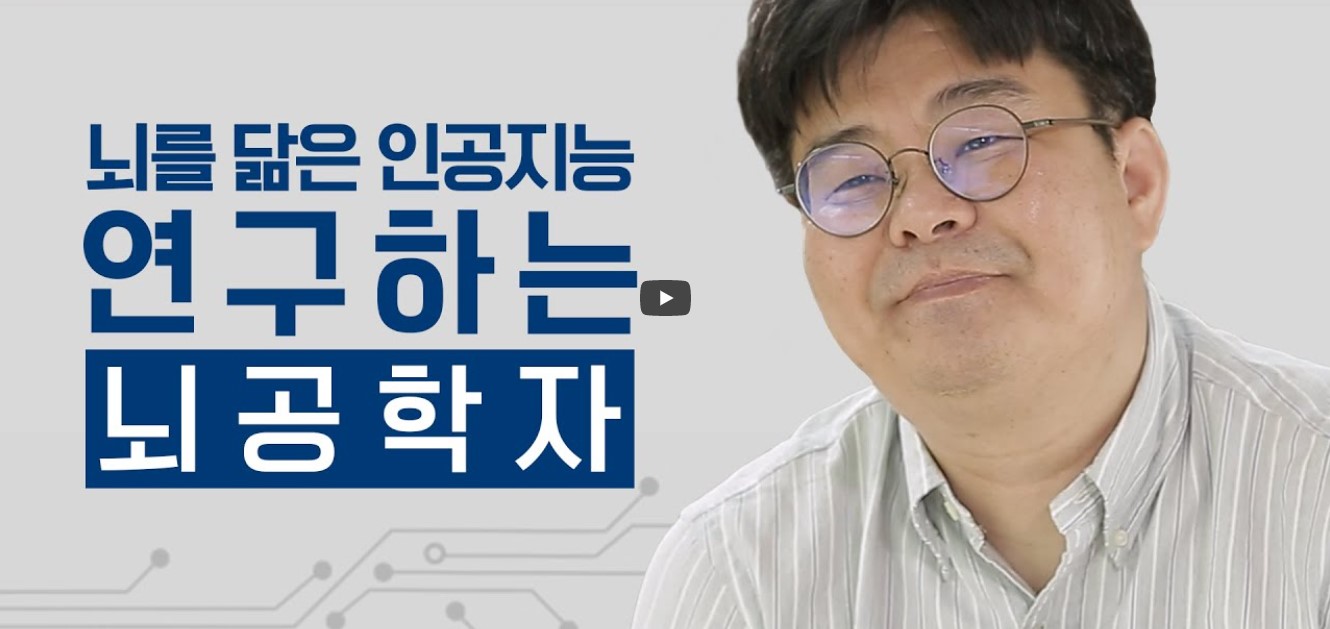|
Check out the latest smart city policy information!
No. 17 (2021.05.31.)
Smart City Issue 2021 P4G Seoul Green Future Summit held 2021.05.30. ~ 05.31.
Photo Source: Blue House
The 2021 P4G Seoul Summit will be held in Seoul on May 2021-5, 30. P4G Seoul Summit In accordance with the Paris Agreement adopted in 2015, this is the first multilateral summit in the environment field to be held in Korea in 2030, the first year the international community begins to take action to achieve the goal of reducing greenhouse gas emissions by 2021.
In particular, at 31 pm on the 4stCities dream of a green future through partnershipsThe city session is organized under the theme of '. The session will be broadcast live on the Ministry of Land, Infrastructure, and Transport YouTube channel.
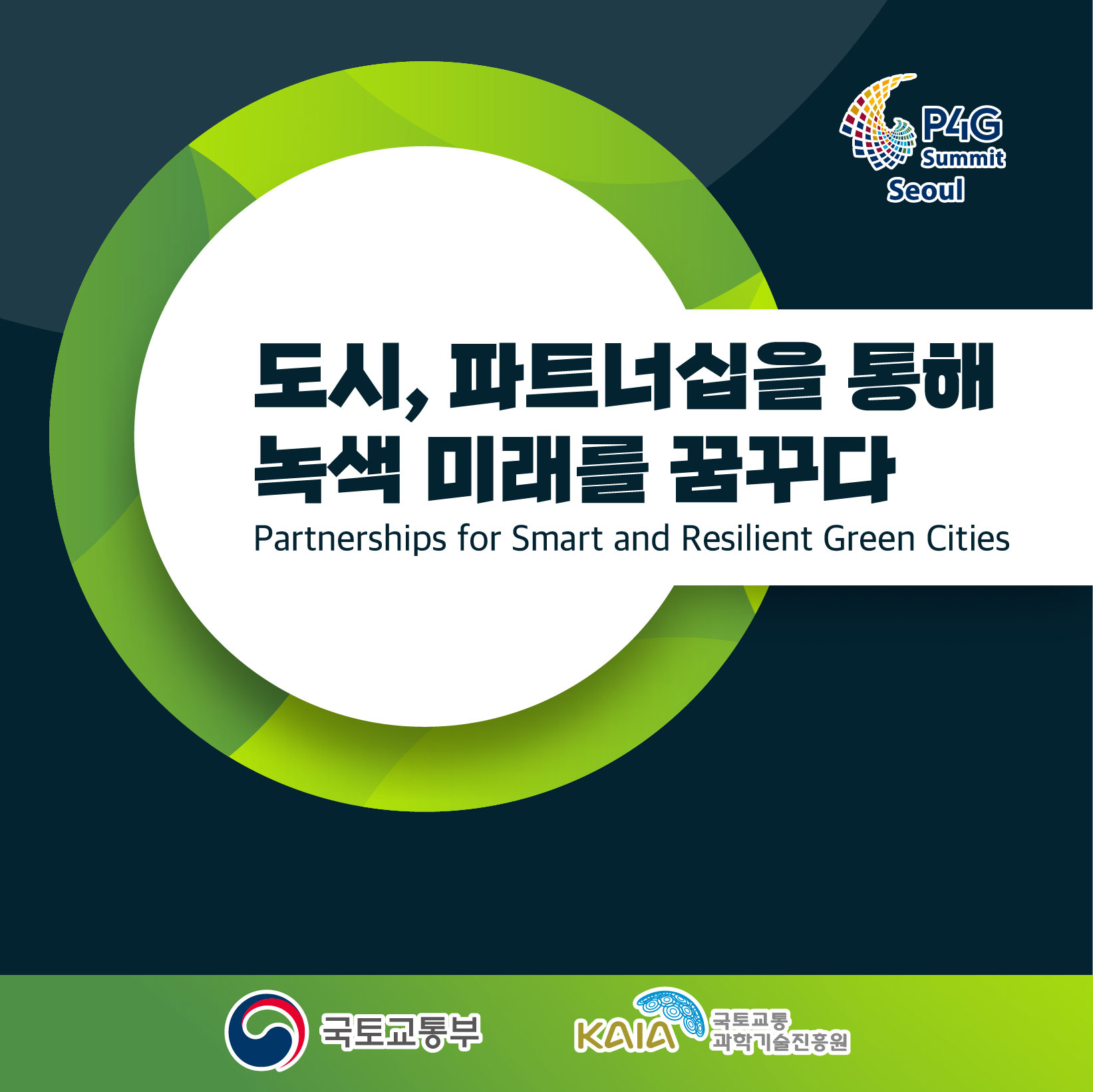 - 일시 : 2021.5.31(월) 16:00~18:30, Youtube
- subject : Partnership for Smart and Resilient Green Cities (City dreams of a green future through partnership)
- Main Content : For a clean city e-Introduction of mobility, Use of eco-friendly buildings, for underdeveloped countries e-Mobility and energy zero building business model, etc.
- Host and Organizer : Ministry of Land, Infrastructure, and Transport and Korea Agency for Infrastructure Technology Advancement (KAIA)
Smart City Special
Autonomous driving·Robot courier to my life...4Milestones to the Second Industrial Revolution 2021.05.25. / Korea's policy weekly <Empathy>
Smart City National pilot smart city is a future city model that fully implements smart city by integrating the 4th industrial revolution technology from the first construction. In January 2018, the government designated Sejong 1-5 Living Zone and Busan Eco Delta City as national pilot smart cities.
Sejong National pilot smart city Restrictions on entry of private vehicles… Mobility Innovation Experiment
The first town we will meet before the first move-in, which is expected at the end of 2023, is a miniature version of the National Pilot Smart City, which will contain a Creative Innovation Center, a PR center, and a complex community. Focusing on the 7 innovation elements of Sejong National Pilot Smart City, such as means of transportation (mobility), healthcare, education, and energy, you can directly experience smart innovation services such as autonomous driving, robot delivery, and artificial intelligence (AI)-based housing service and experience various technologies It is an innovation space that can demonstrate
The use of private vehicles is restricted in an area of about 60 m16 (17 to 1 pyeong) of the National Pilot Smart City in order to overcome the harmful effects of the vehicle-oriented city structure and restore pedestrian-oriented city values. Instead, a shared car-based zone will be introduced to operate personal mobility devices (PM/electric-powered single-person transportation) and self-driving shuttles. Two express bus stops outside the area will be installed to connect them. The shared car-based zone is a representative example of a smart city that minimizes inconvenience to citizens with future technology.
Busan National pilot smart city December First move-in
The 'Busan Eco Delta Smart Village', the first occupancy complex of the National Pilot Smart City to move in in December of 2021, has even selected tenants at the end of 2020. Smart Village is a living lab (laboratory researching in a space where citizens actually live)-type demonstration complex, designed to supplement technology and spread the proven technology throughout the National Pilot Smart City after directly experiencing the service. Tenants have no deposit and no rent for the 5 years of the Living Lab operation period, and only have to pay the monthly management fee. Instead, they plan to verify various technologies to be applied to smart cities, such as participation in living lab operation training, feedback on verification services, and provision of personal information.
[Source] Korea Policy Briefing (www.korea.kr)
Artificial intelligence that resembles the human brain, the future generation that Professor Jae-seung Jung talks about, what if he designs a smart city? 2021.05.21. / Government of the Republic of Korea
To Professor Jae-Seung Jung of the Department of Bio and Brain Engineering at KAIST Currently, artificial intelligence development technology We asked about the smart city that future generations need.
Smart City Policy Project
Smart city becomes safer and smarter with authentication
December 2021.05.06, XNUMX / MOLIT
From August, smart cities with innovation, institutional environment, service technology and infrastructure will receive 'smart city certification' from the government. It is expected that the level of domestic smart cities will be further improved by certifying excellent smart cities. The Ministry of Land, Infrastructure, and Transport announced that they would launch the '8 Smart City Certification Contest' to certify Korea's representative "smart city" at the government level. The smart city certification system is a system that identifies the level of domestic smart cities through smart city performance indicators and assigns 'certification' and 'grades' for comparison between cities.
< Smart city indicator (large category) >
❶(Innovation) Evaluate public, private, and civic capabilities and capabilities and environment for smart city promotion such as information disclosure and data utilization/connection
❷(Governance and institutional environment) Areas where various stakeholders are making horizontal problem-solving and policy-making through active participation (applying governance elements to smart city promotion system, institutional base, and network configuration)
❸(Service technology and infrastructure) Smart city infrastructure elements (intelligent facilities and services, information and communication networks, urban integrated operation center, etc.), where service technology is applied appropriately to the conditions of each local government
Smart city certification is planned to be granted to local governments that are highly innovative according to smart city indicators, have a good governance and institutional environment, and have smart service technologies that are well applied to local conditions. Smart city certification targets are evaluated by classifying them into large cities with a population of 50 or more and small and medium-sized cities with a population of 50 or less, considering the size of the local government. At the end of June (June 6-6.28), proposals from local governments will be received and evaluated, and cities to be certified will be selected in August. Each local government is evaluated on a 30-grade scale, and certification is granted from 8 to 5. The grade of the certified local government is disclosed, and an opportunity to publicize it as an excellent smart city at home and abroad is obtained through the MOLIT Minister's commendation and copper plate award.
Smart City Policy Trend 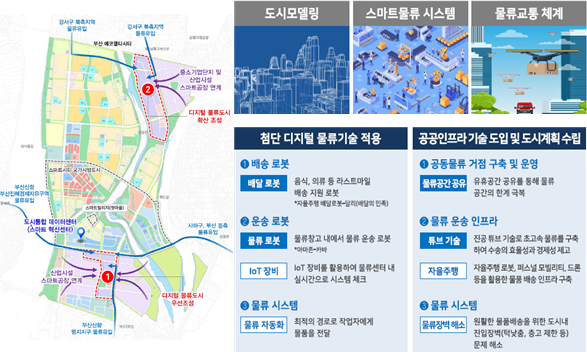 MOLIT promotes the creation of a'digital logistics demonstration complex' utilizing smart logistics technology December 2021.05.19, XNUMX / MOLIT
The Ministry of Land, Infrastructure, and Transport selected a total of 2021 cases, including 4 cases of logistics service demonstration support projects and 2 cases of supporting the creation of a logistics pilot city as the '6 Digital Logistics Demonstration Complex Creation Support Project'. This project was conducted for the first time this year to solve urban logistics problems such as traffic congestion and safety accidents through the implementation of a digital logistics system. After recruiting participating organizations through public offerings for local governments and public institutions, an evaluation composed of experts After a review by the committee, the target audience was selected. 'Logistics Service Demonstration Support' is a project to demonstrate new logistics services in existing cities using smart logistics technologies such as robots and drones, and 'Logistics Demonstration City Support' is a logistics plan targeting new cities such as logistics facilities and logistics networks. project to support the establishment. The selected local governments and public institutions will receive government funding of 5 to 20 billion won each, taking into consideration the size and characteristics, to prepare a logistics plan for the target area and promote service demonstration. 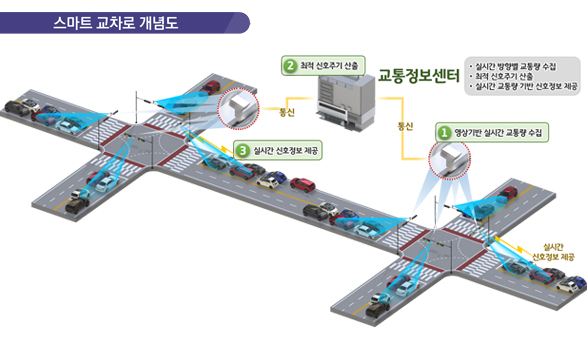 MOLIT expands and builds'Smart Signal Operation System' nationwide December 2021.05.03, XNUMX / MOLIT
The government plans to promote the 'Smart Signal Operation System' construction project in earnest from May to create a safe and efficient traffic environment on major national roads and cities across the country and complete it by the second half of this year. The Ministry of Land, Infrastructure, and Transport announced that it would begin in earnest from May on a project to expand the 'Smart Signal Operation System', which is highly effective in improving traffic at intersections and reducing accidents, to major national highways and urban areas across the country. The smart signal operation system refers to a 'smart signal operation system incorporating digital technology into the traffic system' such as minimizing congestion by optimally controlling signals in real time according to traffic volume to facilitate vehicle flow or giving priority to emergency vehicles such as fire trucks. The Ministry of Land, Infrastructure, and Transport promoted 5 sensitive signal systems ('5~), 2020 emergency vehicle priority signal systems ('509~), and 15 smart intersections ('44~) by 18. As a result of analyzing the operation results, it was found that there are tangible effects such as improving traffic flow and reducing signal violations.
Jeju Island completes preparation for the main business of Smart City Challenge 2021.05.11. / Jeju Island
Jeju Special Self-Governing Province has completed the selection of additional operators for the successful implementation of the Ministry of Land, Infrastructure, and Transport 'Smart City Challenge Main Project' selected on March 3th. Jeju Smart City Challenge This project aims to build a citizen-led 'e-18DA' future living city under the detailed tasks of increasing the usability of smart hub-based green mobility, building a smart energy community based on renewable energy, and building a smart safety net. Following last year's Smart City Challenge preliminary project, this year's main project proceeded with business plan reception and evaluation procedures as it promoted service advancement, and selected companies to perform additional service models according to advancement. Jeju Island plans to hold a kick-off meeting with 3 participating companies in May to prepare a systematic business plan prior to the full-scale project promotion. Incheon City to improve the perfection of 'Smart City Living Lab' 2021.05.02. / Incheon City
Incheon Metropolitan City announced on April 2021 that it held a Living Lab pre-briefing session together with the 'Self-Solution Group*' in Dong-gu, Yeonsu-gu, and Michuhol-gu to promote the operation of the '4 Citizen Participation Incheon Smart City Living Lab' and promote understanding of regional innovation through resident participation.
* The'Self-Solution Group' is an executive organization composed of various stakeholders such as residents, local governments, researchers, and technology experts to discover local issues through participation and collaboration, and to derive solutions using science and technology.
In order to build a specialized smart city and discover smart city services, the city selected three tasks last March, including designing a smart and wise children's life platform in Dong-gu, designing an alternative system for reducing and replacing disposable devices for delivery using ICT in Michuhol-gu, and designing an unmanned parking area for disabled people in Yeonsu-gu.
Smart City News
「2021 Smart Campus Challenge Project」 Idea Contest
-Eligibility: 1 university (graduate) student as the team leader and up to 7 members, including professors, citizens, middle and high school students, and corporate executives, form a team (TEAM) to apply.
– Contents of support: Support for demonstration costs and incentives for smart city ideas for university (graduate) students that incorporate information and communication technology (ICT) to solve civic tangible urban problems such as society, welfare, and safety
– Competition period: '21. 4. 30. (Fri) 〜 7. 30 (Fri), 90 days
– Application period: '21. 7. 29. (Thu) 〜 7. 30. (Fri) 17:00
Smart City Literature
Ways to revitalize smart city exchange and cooperation between Korea and Vietnam Kim Ik-hoe, Jaeyong Lee
National Territorial Research Institute Brief My803호 pp.1-6 (2021.02.)
A study on organizational management methods for sustainable smart city operation Kim Min-young, Kim Jun-hyeong, Lee Sa-bin, Yeom Ji-seon
Journal of the Korean Organizational Society vol.17, no.4, pp.65-97 (2021)
Analysis and Implications of Smart Nation in Singapore: Focusing on Actionable Means of Smart City Initiative Myunghee Kim
Journal of Convergence Information of the Small and Medium Business Convergence Society vol.11, no.1, pp.1-11 (2021)
smartcity@auri.re.kr / 044-417-9668
|






